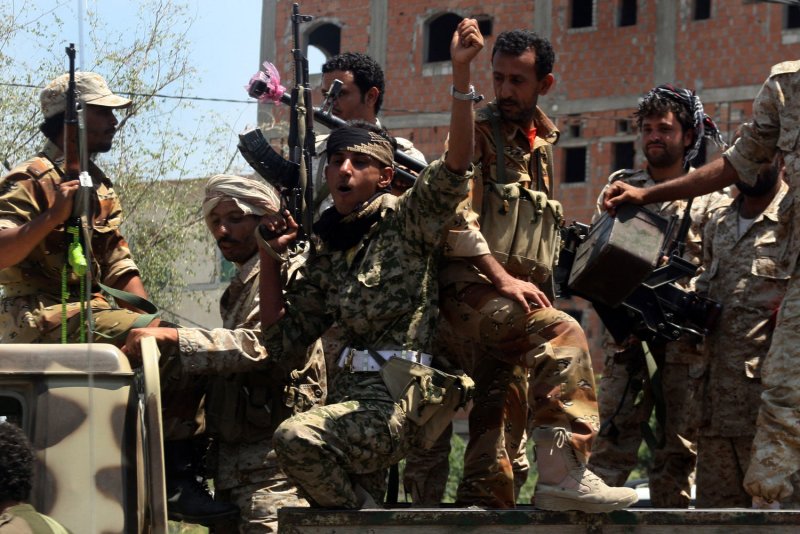1 of 15 | Militants loyal to Yemen's President Abed Rabbo Mansour Hadi take their positions in Taiz, Yemen, March, 30, 2015. At least 45 people have been killed in north Yemen after an airstrike hit a camp for internally displaced people, whilst a Saudi-led coalition continued to strike Houthi targets around the country for a fifth day, the humanitarian agency, Doctors Without Borders (MSF), said. Photo by Anees Mahyoub/UPI |
License Photo
ADEN , Yemen, March 30 (UPI) -- At least 29 people died Monday after an airstrike allegedly struck a refugee camp in northern Yemen, humanitarian workers said.
International medical humanitarian organization Doctors Without Borders said the airstrike hit the al Mazraq camp in the Hajjah governorate, injuring at least 34 people. Of those, 29 were dead on arrival at a hospital in Haradh.
"People in Al Mazraq camp have been living in very harsh conditions since 2009, and now they have suffered the consequences of an airstrike on the camp," said Pablo Marco, Doctors Without Borders operational manager for Yemen. "We call all parties to spare civilians from violence, respect the neutrality of medical facilities and staff, and allow unhindered access to medical assistance for the wounded."
The camp was established in 2009 by refugees fleeing fighting between the Yemeni government and Houthi rebels. Some 500 new families from the western governorate of Saada joined the camp within the last two days.
It's unclear if the deadly incident at the refugee camp was caused by rounds of airstrikes recently launched by a Saudi-led coalition of 10 nations.
Saudi airstrikes destroyed Yemeni military bases and much of Yemen's air force Monday, as Houthi rebels attacked the port city of Aden.
The Houthis, an offshoot of the Islamic Shiite branch which comprises about 40 percent of Yemen's population, approached the strategic port city of Aden over the weekend, located on the Bab al-Mandrab waterway through which the U.S. Energy Information Agency estimates 3.8 million barrels of oil pass daily.
The Saudis have a large but untested ground combat force ready to invade Yemen if necessary.
A senior Yemeni air force official said Sunday 11 of the country's 16 fighter planes were destroyed in the Saudi-led airstrikes. The Houthis, though, still control much of over $500 million in military equipment, provided to Yemen by the United States since 2010.
The Saudi state news agency reported Saudi Brig. Gen. Ahmed bin Hasan Asiri said Saturday, "Houthi militias no longer possess any planes and they no longer have command and control, inside or outside the air bases."
The Houthi rebels, loyal to ousted President Ali Abdullah Saleh and assumed to be relying on Iranian military and financial assistance, made quick advances from northern Yemen to the capital of Sanaa and now to Aden, driving out current President Abd-Rabbu Mansour Hadi.
The conflict has accelerated since Saudi Arabia, which shares the Arabian Peninsula with Yemen, got involved with airstrikes last week, and a drawn-out proxy war between Sunni Saudi Arabia, supporting the Hadi government, and Shiite Iran, aiding the Houthis, is anticipated.
Hadi was driven out of Sanaa for Aden last month, and attended an Arab League summit meeting in Sharm El Shiekh, Egypt, over the weekend before leaving with the Saudi contingent for Riyadh. At the meeting, the 22-nation Arab League agreed to the formation of a joint task force, a NATO-style fighting force prepared to defend any member state, although it will be months before it is organized and effective.
A televised speech Saturday by Saleh in which he called for Saudi-brokered peace negotiations, including declining any role in a new Yemeni government, further complicated the conflict. A senior Houthi official, Ahmed al Bahri, responded by insisting the Houthis would only negotiate if the Saudis were not involved.
"We seek dialogue under an independent umbrella like the United Nations. Saudi [Arabia] considers us the enemy," he said.
Iran called the Saudi bombing campaign a "dangerous move that would kill any chance of peaceful resolution of the crisis," and the Houthis threatened suicide bombing attacks within Saudi Arabia.
Another factor in the conflict is the role of al-Qaida and Islamic State, each of which has forces in Yemen. Previous governments have been cooperative partners of the United States in locating and destroying al-Qaida hideouts with Yemen, and some Houthi forces have an unsteady alignment with al-Qaida. However, neither the IS nor al-Qaida is regarded as an ally of the Houthis. Suicide bombings at two Sanaa mosques, blamed on IS, killed at least 150 people earlier in March.
The situation in Yemen is now much like that in Bosnia 20 years ago, with shifting factions, aerial assaults and influence by outside rivals. The risk is that severely weakened Yemen will collapse into constant turmoil with resources expended by several sides to take control. The United States, which supports the Hadi government and provides the coalition with intelligence reports, is on the verge of losing a valuable, if impoverished, ally in the Arabian Peninsula.















